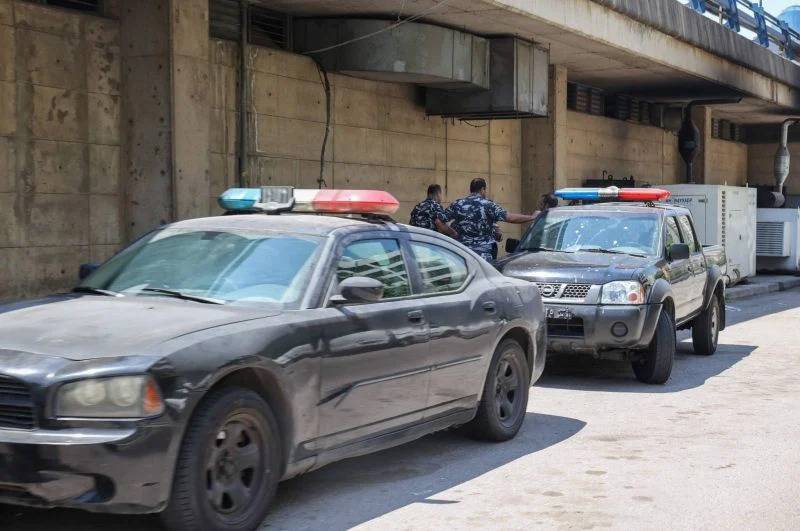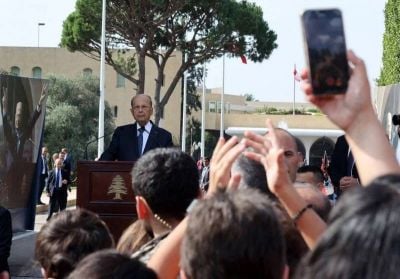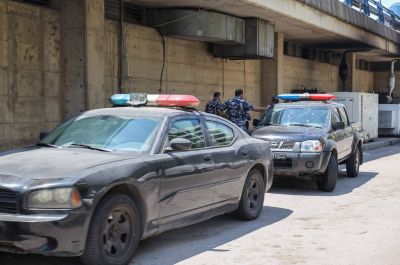
Lebanese police outside a detention center in Beirut on Aug. 7, 2022, after an escape by several detainees. (Credit: Anwar Amro/AFP)
Is the fundamental right to freedom now in danger in Lebanon? An unprecedented decision taken in September by the Director General of the Internal Security Forces Imad Osman, and recently revealed to the general public, is causing a stir within justice circles and human rights organizations.
The internal memo sent to police units by Major General Osman gives them the authority to issue arrest warrants for defendants, even without the authorization of the public prosecutors.
However, while Osman’s instructions are only related to cases where the defendants are caught red-handed, the law grants only the public prosecutor’s office the authority to keep under arrest any person apprehended.
In a context where the failure of justice makes it easier for security authorities to overstep their powers, the course of justice has been given a serious blow.
The outcry within the judicial circles was the reason behind the meeting held late Monday afternoon between Osman and Court of Cassation Public Prosecutor Ghassan Oueidat, after which Osman explained his approach.
According to him, the memo was based on the Code of Criminal Procedure and ISF regulations, under which, in case of flagrant violation, judicial police officers are entitled to arrest a suspect and investigate the crime under the authority of the attorney general.
“No one was arrested without judicial instruction,” he said in a statement Monday, adding that “the purpose behind the memo was to push the ISF officers to go to the crime scene where the perpetrator was caught red handed and then reach out to the prosecutor general.”
Moreover, Osman assured that there is no dispute about the memo with Oueidat. The ISF’s supervisory authority, Interior Minister Bassam Mawlawi, was also aware of Osman’s memo, his spokesperson told L’Orient-Le Jour.
Unconstitutional and illegal
But what the security official failed to mention is that he gave the police prerogatives that are specific to judges. Nizar Saghieh, executive director of the advocacy group Legal Agenda, noted that Osman’s statement Monday did not address the content of the internal memo, which addresses cases where “the judicial police fails to communicate with the prosecutors’ offices, or when the latter fail to give their judicial instructions.”
“In the absence of judicial authorization, the ISF director granted all the powers of the Public Prosecutor’s Office to the judicial police,” Saghieh told L’Orient-Le Jour. This is where the problem lies.
According to the memo, the police can in this case investigate and make arrests without consulting with the prosecutor,” he lamented.
“How is it possible to verify that a police officer has really tried to contact a prosecutor? No one should be incarcerated under the pretext that the prosecution has not responded,” said Saghieh, adding that “the right to freedom is a principle enshrined in the constitution.”
“Article 8 states that no one can be arrested or detained except in accordance with the law. In other words, it is a violation of the law to deprive an individual of his freedom outside a legal text,” he explained.
“A simple memo cannot therefore grant the police a power that the law reserves for magistrates,” he said, warning against the advent of a “police state.”
“Replacing judicial power with security power to decide to imprison a suspect sadly recalls the idea, albeit on a completely different level, of substituting the judicial investigating judge with an alternate judge,” he said, referring to caretaker Justice Minister Henri Khoury’s proposal to appoint an alternate judge to Beirut port blast probe judge Tarek Bitar to rule on specific issues in the case.
Commenting on whether Osman’s memo is likely to be challenged before the State Shura Council, a lawyer who declined to be named said yes — provided that the high jurisdiction considers this memo as relevant to the organization of the judicial public service, not to its operation.
It is also possible to file a complaint to the interior minister in order to have the memo canceled. However, the lawyer indicated that it is unlikely for the minister to agree to cancel it, especially since he has not expressed any objection so far.
Finally, the ISF head may be subject to criminal proceedings, but again, this is a hypothetical option, since such proceedings require that the interior minister lifts Osman’s immunity.
‘It is not true that the public prosecutors’ offices are unreachable’
A judge who asked not to be named as he was not authorized to speak to the press said that it is inaccurate to claim that the public prosecutors’ offices are unreachable during the current strike. He stressed that “the prosecutors have not stopped working on urgent matters, including arrests.”
Moreover, according to this source, the power of giving instructions related to a particular case is not limited to a single judge. In each governorate, and under the principle of the prosecution’s unity, several public prosecutors perform this function, and can therefore be reached.
According to this judge, the strike has been used as a “pretext” by the ISF head to claim for himself the right to give police units “additional prerogatives that encroach on those of the judiciary.”
However, the judge said that any person arrested must have the “judicial guarantee.”
“By being deprived of the [right] to have a judge examine his case, a person apprehended does not enjoy this guarantee, which is a fundamental right,” he said.
Ashraf Rifi, MP for Tripoli and former ISF director, also said that this measure by Osman is “illegal.”
“The security forces do not have the authority to keep a defendant in custody for more than 24 hours,” he told L’Orient-Le Jour.
“The 24-hour arrest is [an] administrative [decision]. Any decision to deprive a person from his freedom exceeding this period is judicial. It is therefore the sole responsibility of the judge to take [this decision],” he said.
Rifi recognized that the judges’ strike is “a problem,” but he believes that “it does not justify the issuance of decisions that are contrary to the law. “We are in a vicious circle, from which we can only get out through the re-establishment of the state,” he said.
This article was originally published in French in L’Orient-Le Jour. Translation by Joelle El Khoury.


